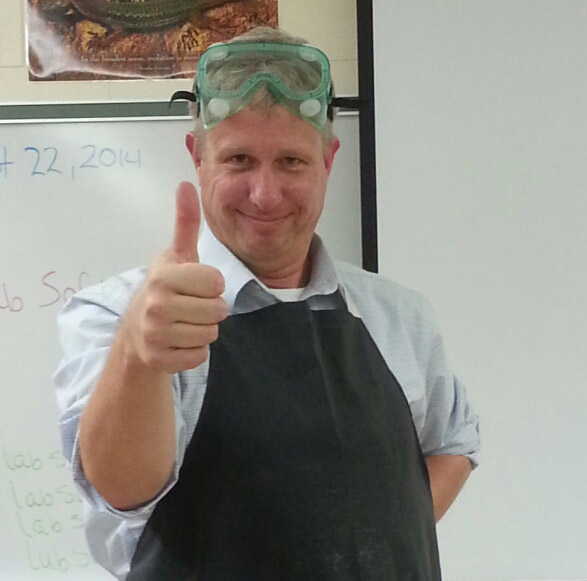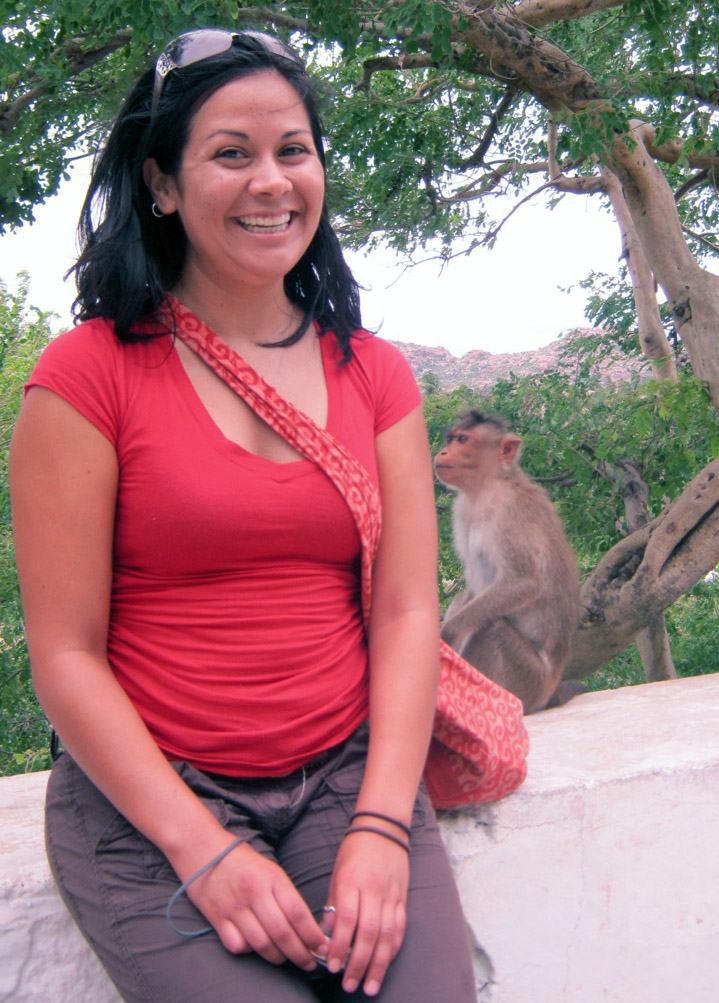 NCSE rafters examining Vulcan's Anvil, one of Grand Canyon's geological wonders. Photo by Josh Rosenau, 2014.
NCSE rafters examining Vulcan's Anvil, one of Grand Canyon's geological wonders. Photo by Josh Rosenau, 2014.NCSE is pleased to announce the winners of the second teacher scholarships on our annual Grand Canyon raft trip: Brandon Haught of University High School, Orange City, Florida, and Crystal Davis of Hawthorne Math and Science Academy, Hawthorne, California. They will receive an all-expenses-paid eight-day raft trip through the Grand Canyon, guided by two members of NCSE's staff and joining twenty other NCSE members and supporters who purchased seats on the trip. The scholarship funds were donated by the generosity of NCSE's members.
"This trip will be the adventure of a lifetime for Haught and Davis," explained NCSE's Steve Newton, a geologist and one of NCSE's guides on the annual raft trip. "Teachers who work so hard for their students and the science-literate future of America deserve some time to relax on the Colorado River. But we'll be making them work, too. The Grand Canyon is the greatest geology teaching lab in the world, and they'll be able to explore geological processes up close, place their hands on rock layers laid down before the first multi-cellular fossils, and see how plate tectonics, erosion, volcanoes, wind, and waves built up and carved down the landscape. I can't wait to see what lesson plans they develop based on that experience." As part of the scholarship application, both teachers committed to produce a lesson plan and student assessment based on the trip, which NCSE will make available for other teachers to use.
 Brandon Haught is in his second year of teaching. Before entering the classroom, Haught was a combat correspondent in the United States Marine Corps, a graphic designer and newspaper columnist, and spokesperson for a Florida sheriff's department. He was also a founding board member of Florida Citizens for Science, a grassroots organization that defends the integrity of science education in the Sunshine State. His activity with Florida Citizens for Science led to his researching and writing a book on the history of the creationism/evolution controversy there, Going Ape: Florida's Battles over Evolution in the Classroom (2014), described by Michael Ruse as "[a] fascinating and important account of the battles over evolution in one of the nation's largest states." Haught now teaches biology and environmental science; he was named the first-year teacher of the year at his school in 2014-2015. In his application, he explained, "Climate change and evolution are required subjects in my curriculum, which motivates me to find any opportunity I can to get off the school campus and out of the books and discover ways to get my hands on something meaningful and real. Spending several days in the Grand Canyon learning from professionals and sharing with peers definitely fits the bill."
Brandon Haught is in his second year of teaching. Before entering the classroom, Haught was a combat correspondent in the United States Marine Corps, a graphic designer and newspaper columnist, and spokesperson for a Florida sheriff's department. He was also a founding board member of Florida Citizens for Science, a grassroots organization that defends the integrity of science education in the Sunshine State. His activity with Florida Citizens for Science led to his researching and writing a book on the history of the creationism/evolution controversy there, Going Ape: Florida's Battles over Evolution in the Classroom (2014), described by Michael Ruse as "[a] fascinating and important account of the battles over evolution in one of the nation's largest states." Haught now teaches biology and environmental science; he was named the first-year teacher of the year at his school in 2014-2015. In his application, he explained, "Climate change and evolution are required subjects in my curriculum, which motivates me to find any opportunity I can to get off the school campus and out of the books and discover ways to get my hands on something meaningful and real. Spending several days in the Grand Canyon learning from professionals and sharing with peers definitely fits the bill."
 Crystal Davis teaches environmental science, biology, and anatomy and physiology at the Hawthorne Math and Science Academy. She has taught AP courses in the Los Angeles area for over ten years. The Title I school where she teaches is in a city once labeled "whites-only," but which now has only 10% non-Hispanic white population. Her students live adjacent to a major international airport, and a few miles from the beach, yet, she observes, “Few of my students travel domestically or internationally. In fact, over 70% have never been to the beach, even though it only takes fifteen minutes to get there from school.” She works to bring her students to national parks, recognizing, “Due to this lack of exposure to nature, I find the most significant challenge to environmental science education is getting students to care about the environment and to make changes in their own lives.” The trip to the Grand Canyon will let her share the wider world with her students, and help them share the lessons with other students. She explains, "I plan to work with my students to develop mini-lessons that they can present to middle school students in an after-school program."
Crystal Davis teaches environmental science, biology, and anatomy and physiology at the Hawthorne Math and Science Academy. She has taught AP courses in the Los Angeles area for over ten years. The Title I school where she teaches is in a city once labeled "whites-only," but which now has only 10% non-Hispanic white population. Her students live adjacent to a major international airport, and a few miles from the beach, yet, she observes, “Few of my students travel domestically or internationally. In fact, over 70% have never been to the beach, even though it only takes fifteen minutes to get there from school.” She works to bring her students to national parks, recognizing, “Due to this lack of exposure to nature, I find the most significant challenge to environmental science education is getting students to care about the environment and to make changes in their own lives.” The trip to the Grand Canyon will let her share the wider world with her students, and help them share the lessons with other students. She explains, "I plan to work with my students to develop mini-lessons that they can present to middle school students in an after-school program."
NCSE's Josh Rosenau, a biologist who guides the raft trip along with Steve Newton, says: "Great science education doesn't end at the schoolhouse door, and challenges to science have to be confronted in the community and the halls of power. Haught and Davis show how important it is for teachers — and anyone concerned with improving science education — to speak up for science in churches and legislatures, addressing misconceptions and harmful ideologies before they infiltrate classrooms. We're proud to honor their remarkable work, and that of so many other teachers who share that commitment."
Dozens of teachers applied for the two seats, providing copies of lesson plans, explaining how they incorporate evolution and climate change in their classrooms, and how they have confronted efforts to politicize or undermine science education. Haught and Davis stood out not just for their excellence in the classroom, but also for their efforts to make their communities safer for science and science education.
"We were gratified by the response to this scholarship, and can't wait to offer more scholarships in future years," says NCSE executive director Ann Reid. "There were so many teachers we wished we could have brought with us, and we're grateful to NCSE's members and supporters who donated to the scholarship fund (to which donations are still welcome). When communities, scientists, and teachers come together, great things happen."
